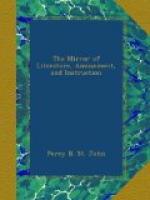The Day after the Battle of Waterloo.—June 19.
British bayonets are victorious!—Napoleon’s army a wreck, panic-stricken, flies before Wellington and Blucher! I will not forget your anxieties even in this moment of fatigue and agitation. The combined forces are covered with immortal fame; they have vanquished the elite of Napoleon’s empire, and those veteran generals most attached to his person and dynasty. They are in full flight, and we in glorious pursuit!—Ere this reaches you, the Allies will probably have entered Paris a second time within the year. We learnt that Napoleon had left the capital of France on the 12th: on the day of the 15th the frequent arrival of couriers excited extreme anxiety; and towards evening General Mufflin presented himself at the Duke’s with dispatches from Blucher. We were all aware that the enemy was in movement, and the ignorant could not resolve the enigma of the Duke going tranquilly to the ball at the Duke of Richmond’s:—his coolness was above their comprehension; had he remained at his own hotel, a panic would have probably ensued amongst the inhabitants, which would have embarrassed the intended movement of our division of the army.
I returned home late, and we were still talking over our uneasiness, when our domestic distinctly heard the trumpet’s shrill appeal to battle within the city walls, and the drum beat to arms. Ere the sun had risen in full splendour, I distinguished martial music approaching, and I soon beheld from my windows the 5th reserve of our army passing: the Highland brigade, in destructive warlike bearing, were the first in advance, led by their noble thanes, the bagpipes playing their several pibrochs; they were succeeded by the 28th, their bugles’ note falling more blithely upon the ear. Each regiment passed in succession with its band playing, impatient for the affray and fearless of death, meeting the peaceful peasant’s carts bringing sustenance for the living. Those of my acquaintance looked gaily up at the window—alas! how many of them were before sunset numbered with the dead;—Scotland’s thanes, ere they had traversed the Bois de Soignies, and the Duc de Brunswick-Oels that evening at Quatre Bras, stimulating onward his valiant hussars, and too carelessly exposing his person.




